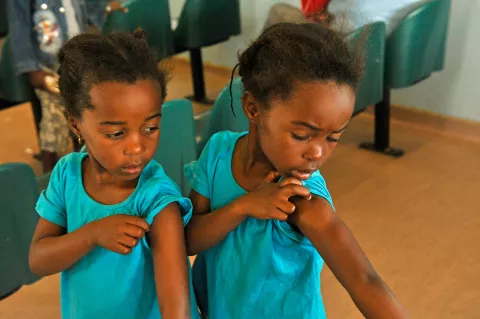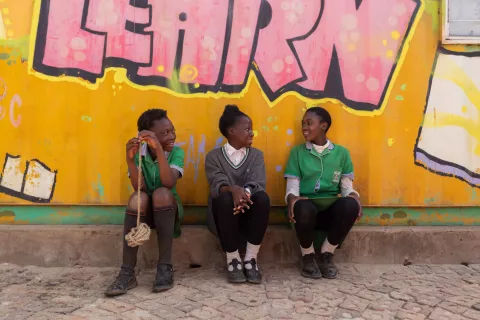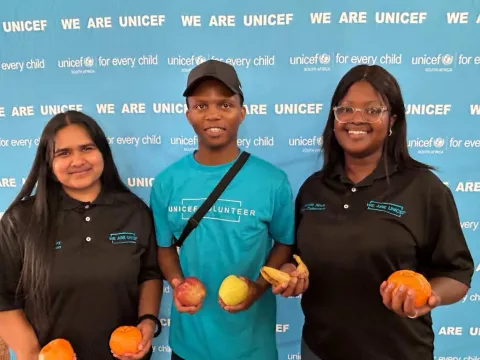South Africa calls for ‘big catch-up’ to improve immunization coverage
Africa Vaccination Week event welcomes extraordinary global and national progress in protecting children from deadly but preventable diseases, while highlighting efforts needed to improve immunization coverage.

HEBRON, Madibeng, 30 April 2024 – The critical importance of vaccinations in protecting the health and well-being of children and communities, alongside work needed to scale-up coverage, was recognized today at an Africa Vaccination Week event in Hebron, North West province.
The theme, "The Big Catch Up: Vaccinated Populations, Healthy Populations", underscored the role of routine immunization in saving lives and improving health outcomes over the past three decades in South Africa and following fifty years of the global Expanded Programme on Immunization (EPI).
“South Africa has made significant progress in expanding access to a range of lifesaving vaccinations,” said Christine Muhigana, “The focus now is to tackle the challenges that persist in improving immunisation coverage so that every child – everyone – in hard-to-reach areas is protected,” Muhigana added.
Inequities in access to vaccines, the emergence of new and evolving threats to public health, and the ever-evolving circulation of mis and disinformation about the efficacy and safety of vaccines all combine to result in children missing out on lifesaving vaccines.
The event in Madibeng sub-district, attended by the Minister of Health and multiple partners, follows the coming release of a landmark study by The Lancet, which reveals that global immunization efforts have saved an estimated 154 million lives. This is the equivalent of 6 lives every minute of every year – over the past 50 years, with most lives saved – 101 million – being infants.
“We must build on this extraordinary global success story and momentum to ensure immunization for every child across South Africa,” said Muhigana. “Thanks to vaccinations, more children now survive and thrive past their fifth birthday than at any other point in history,” she added.
Of the vaccines included in The Lancet study, the measles vaccination had the most significant impact on reducing infant mortality, accounting for 60 per cent of the lives saved due to immunization. This vaccine will likely remain the top contributor to preventing deaths in the future.
UNICEF South Africa supports the National, Provincial and District Health Departments to help strengthen immunization systems, to improve information about and access to vaccinations and to drive demand to ultimately reduce the number of zero dose children.
UNICEF is committed to further strengthening efforts so that every child – every community – is protected. This includes through:
- Empowering parents to monitor their children’s health and vaccination needs, such as through the Road to Health booklet.
- Preventing vaccine stock-outs at healthcare facilities through effective vaccine management.
- Tackling vaccine hesitancy by communicating the positive impact of 50-years of immunization in saving millions of young lives.
UNICEF thanks partners for their engagement and generous support to these efforts, including ELMA Philanthropies, USAID, and the Governments of Germany and Japan, among others.
Media contacts
About UNICEF
UNICEF works in some of the world’s toughest places, to reach the world’s most disadvantaged children. Across more than 190 countries and territories, we work for every child, everywhere, to build a better world for everyone.
Follow UNICEF South Africa on Twitter, Facebook, Instagram, YouTube, LinkedIn and TikTok




